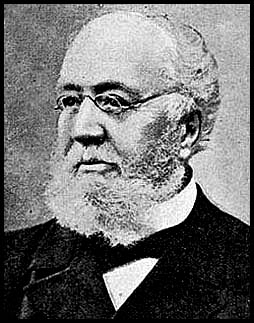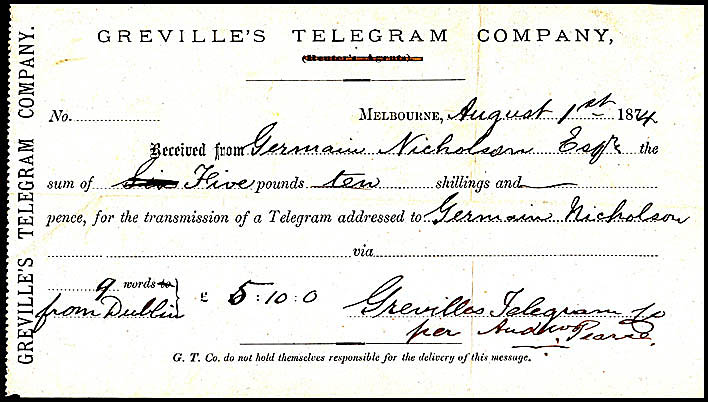Greville’s Telegram Company.
- Australia 1901-1988
- New South Wales
- Overview of NSW
- Telegraph lines
- Telegraph Offices
- Date stamps
- Forms
- Envelopes
- Instructional annotation
- Collect
- Delayed
- Free
- Immediate Urgent
- Reply paid
- Rates
- Stamps
- 1871 Telegraph stamps
- 1885 proposal
- 1893 proposal
| Edward Greville started operations in 1861 mainly to supply news to country newspapers through the developing domestic telegram network.
He was born in Bristol in 1822 and migrated to Victoria in 1852. The News Agency. He migrated to Sydney in the following year and established a news agency. After establishing himself, he entered into a partnership with Charles Octavius Bird in 1861 to open a telegraphic and advertising agency in Bridge Street. The main purpose of the agency was to supply news to country papers. At that time, the telegraph system in NSW was established and expanding rapidly. The partnership only lasted for 5 years after which Greville operated the business by himself. |
 |
Advertisements.
At some time, Greville & Bird opened an office in Brisbane. In the Brisbane Courier of 3 June 1864, there appeared the following advertisement:
GREVILLE & BIRD'S TELEGRAPH OFFICE,
on the Cricket Ground, next Tent to the right hand of the Grand Stand.
Messages forwarded at any moment in the day.
A typical advertisement for the services offered by the partnership appeared in the Sydney Empire of 14 December 1863 (p.6):
GREVILLE and BIRD'S TELEGRAPH OFFICE.
REUTER'S AGENTS (Brisbane-Sydney-Melbourne-Adelaide-Otago-Launceston),
8 BRIDGE-STREET, SYDNEY.Messrs. GREVILLE and BIRD offer their services to residents in the country, whether engaged in commerce or otherwise, as Sydney correspondents, from whom they may obtain periodical or special information on events occurring either in this or the neighbouring colonies, including changes of the markets, arrivals of ships, etc etc. A letter or telegram asking information or requiring the transaction of business will always meet with immediate attention.
Messages are forwarded by them for parties who may lose the English post to their Melbourne or Adelaide agents, who will write them out and piece them on board the mail steamer. The charges will be regulated by the labour involved in the transaction of the special business.
Short-hand writing and reporting in all its branches undertaken.
During the partnership with Bird, Greville became the Reuter’s Agent in Colonial Australia. In part this role involved distributing and collecting news but it also involved the telegraphic transfer of money for individuals and for businesses. The remittances - within Australia and beyond - later became a significant part of Reuter's Australian operations.
In the Sydney Morning Herald on 25 October, 1872, the following announcement was printed:
“The submarine being now in working order, GREVILLE’S TELEGRAM COMPANY are prepared to dispatch Private Messages to all parts of the world. By the company’s registration system, a considerable saving is effected in the transmission of telegrams. Full particulars and forms of registration may be obtained on application at the Company’s offices”.
Many country newspapers therefore carried almost daily stories with the acknowledgement TELEGRAPHIC NEWS. [From Greville's Telegram Company (Reuter's Agents)] under the headline. That practice continued for many years although, from June 1874, Reuters used their own personnel rather than Greville's Agency. After that split, the acknowledgement was "Through Greville's Telegram Company".
 Possibly the only document from Greville's Telegram Company now known. |
An example of a Greville's receipt.
An amount of £5/10/- had been paid by Germain Nicholson for a telegram sent to her from Dublin. The words "Reuters Agent" (under TELEGRAM) are crossed out as the split with Reuters had occurred two months previously. |
Later endeavours.
Edward Greville expanded his range of activities by acquiring extensive agencies for wholesale stationers' and printers' supplies. He also published the Illawarra Express.
In the late 1860s, Greville started a political career in which he was elected to both the Lower and the Upper Houses of the NSW Parliament. In the Australian Town and Country Journal of 8 October 1870, there was a news item which read: " A numerously signed requisition from the electors of this district has been forwarded to Mr. Edward Greville, requesting him to stand for the district". While in Parliament, Greville was a leader in the debates about confidentiality of the content of telegraphic messages.
In 1872, as Greville & Co., Edward Greville began publication of the Official Post Office Directory of New South Wales. In 1875, this publication was expanded to include a gazetteer and essays on the geography, history and natural resources of the colony. In recognition of the usefulness of this directory, the New South Wales government bought about a thousand copies of the 1875 edition for official use. Greville expanded the scope of the publication and renamed it as the Official Directory and the Almanac of Australia. From 1881, the name was changed again to The Year Book of Australia.
The Catholic Press noted his passing in the 16 July 1903 issue with the following:
"Edward Greville, M.L.C., who died a few days ago, was an Oxford man and a gentleman of the old school, the pink of courtesy and, to the end, the pink of fashion. He was handsome in his young days and was always stately. He loved his joke, his good dinner and choice cigar and, up to a few years ago, one found one of the brightest wits at his table.
He was a friend of Edmund Barton of Parkes, Windeyer, and of all the old lights who went out in the course of time. Agent-General Copeland was his most intimate comrade. When he edited a paper, Denehey was one of his contributors and Greville regarded him as the greatest literary genius and the finest scholar Australia has produced. Young writers could always depend of getting Edward Greville's sympathy and help. He was the dearest of friends and, even in his seventies, as youthful as a boy. He was not a forceful character and, being kind-hearted and gentle in disposition as well as in manner, he never made an enemy. He belonged to the Greville 'Memoir' family, and he died without a relative in the world".